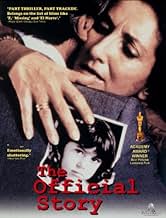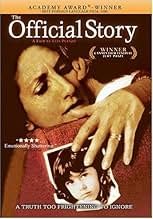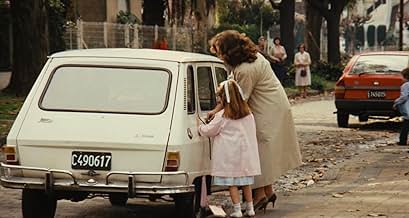IMDb-BEWERTUNG
7,7/10
11.463
IHRE BEWERTUNG
In den letzten Monaten der argentinischen Militärdiktatur im Jahr 1983 macht sich eine Gymnasiallehrerin auf die Suche nach der Mutter ihrer Adoptivtochter.In den letzten Monaten der argentinischen Militärdiktatur im Jahr 1983 macht sich eine Gymnasiallehrerin auf die Suche nach der Mutter ihrer Adoptivtochter.In den letzten Monaten der argentinischen Militärdiktatur im Jahr 1983 macht sich eine Gymnasiallehrerin auf die Suche nach der Mutter ihrer Adoptivtochter.
- Regie
- Drehbuch
- Hauptbesetzung
- 1 Oscar gewonnen
- 25 Gewinne & 9 Nominierungen insgesamt
Empfohlene Bewertungen
In the powerful 1985 film The Official Story, Director Luis Puenzo tells the story of a teacher's awakening to conscience at the end of Argentina's "Dirty War" of the late 70s and early 80s. As in Pinochet's Chile, the military secret police sought to consolidate their power by routinely torturing and murdering students, political activists, opponents of the regime, and even expectant mothers. Many ended up as desaparecidos, people taken by the government and not returned. The film is about one mother's search for the truth about her adopted daughter and her discovery brings harsh political reality very close to home.
In The Official Story, Alicia (Norma Aleandro) lives a comfortable middle class life. She teaches History to high school students and enjoys a family that includes her well-to-do husband Roberto (Hector Alterio) and 5-year old adopted daughter Gaby (Analia Castro). Not used to asking questions, she believes whatever she has read in history books and is confused when one of her students tells her that "history is written by assassins." She sees the demonstrations of the "Mothers of Plaza de Mayo", a group seeking information about missing family members but remains uninvolved. When her friend Ana (Chunchuna Villafane) visits after living in exile for many years, however, she learns, in an intensely emotional scene, that Ana had been imprisoned and tortured by the police trying to locate her husband, a suspected "subversive".
Ana tells Alicia that many others had "disappeared" and that babies had been taken from their mothers and given to childless friends of the junta. Alicia begins to wonder if her own child was the daughter of a political victim and questions her husband but when he is evasive, she suspects that he may be hiding a dark secret. Although fearful at the prospect of losing Gaby, Alicia is determined to find out about her daughter's past and begins to search hospital records and government archives. Ultimately, she must confront her own responsibility in a climax of shattering force that underscores the tragedy of political ideologues who would rather destroy family solidarity than risk losing power.
In The Official Story, Alicia (Norma Aleandro) lives a comfortable middle class life. She teaches History to high school students and enjoys a family that includes her well-to-do husband Roberto (Hector Alterio) and 5-year old adopted daughter Gaby (Analia Castro). Not used to asking questions, she believes whatever she has read in history books and is confused when one of her students tells her that "history is written by assassins." She sees the demonstrations of the "Mothers of Plaza de Mayo", a group seeking information about missing family members but remains uninvolved. When her friend Ana (Chunchuna Villafane) visits after living in exile for many years, however, she learns, in an intensely emotional scene, that Ana had been imprisoned and tortured by the police trying to locate her husband, a suspected "subversive".
Ana tells Alicia that many others had "disappeared" and that babies had been taken from their mothers and given to childless friends of the junta. Alicia begins to wonder if her own child was the daughter of a political victim and questions her husband but when he is evasive, she suspects that he may be hiding a dark secret. Although fearful at the prospect of losing Gaby, Alicia is determined to find out about her daughter's past and begins to search hospital records and government archives. Ultimately, she must confront her own responsibility in a climax of shattering force that underscores the tragedy of political ideologues who would rather destroy family solidarity than risk losing power.
I saw this movie in my first-year Spanish class. I love all kinds of movies, both international and domestic. This is by far one of the best movies I have seen in the international field with particular focus on the character development of one woman who seems to have everything. In coming to terms with the truth of her lifestyle and the high price others have paid for her comfort, she becomes a heroine who must give up almost everything she has loved and felt identified who she is. This movie is both heartbreaking and reassuring for its audience. I highly recommend it as a thoughtful depiction of how ignoring politics can imply inadvertently becoming an accomplice.
La Historia Official is a well-made film about awakening from passive complicity in evil, in this case, forced adoption. The Grandmothers of the Plaza de Mayo were and are an inspiration to those who struggle to uncover and resist abuses in adoption practices, be they the enslaved Irish women of the Magdalen laundries or the many indigenous peoples who had children forcibly removed from homes to be adopted by whites. Most of adoption does not involve abduction, but to turn a blind eye to the fact that it does exist, is to be passively complicit, as was the protagonist in this film.
The scene in which the teacher realizes that tremendous evil has indeed been perpetrated, and that she may very well be the beneficiary of such evil, is staggering. Norma Aleandro is a talented enough actress that we believe her initial rejection of this revelation, and her gradual evolution from passive cohort to courageous seeker of the truth.
The scene in which the teacher realizes that tremendous evil has indeed been perpetrated, and that she may very well be the beneficiary of such evil, is staggering. Norma Aleandro is a talented enough actress that we believe her initial rejection of this revelation, and her gradual evolution from passive cohort to courageous seeker of the truth.
La Historia Oficial is an excellent movie. It is also the testimony of the suffering of the Argentinian people during the military dictatorship. But those who are not from Argentina, like myself, can very well be touched by this movie. I was observing the cruelty of the government and thought "my God, totalitarism is always the same, and no matter if the violation of human rights occurs in Argentina under the military regime, in Cuba under the Castro dictatorship, in Chile under Pinochet, in Europe during Hitler, people suffer the same and the least we can do is to feel compassion". A good lesson from this movie, generation after generation we shouldn't forget the victims. They deserve justice.
Its hard to convey just how moving this movie is. Its absolutely haunting, I thought about this flick for days afterwards. I don't think it represents the experiences of many Argentines during the era of the juntas, but it clearly shows how awful those times were and why Argentines never want to return to that situation again.
Wusstest du schon
- WissenswertesThe filming began in 1983, the same year that the military dictatorship ended in Argentina. The filming was cancelled due to the threats received by the director, actors and particularly to Analia Castro's family. It was announced that filming was cancelled, but production continued in secret until 1985.
- Alternative VersionenThe 2015 restoration is extended by 2 minutes due to the inclusion of restoration credits at the beginning and end of the film. The opening restoration credits play over the opening scenes in Alicia's classroom. During the restoration end credits, the background goes black and the instrumental version of 'El país de nomeacuerdo' is looped.
Top-Auswahl
Melde dich zum Bewerten an und greife auf die Watchlist für personalisierte Empfehlungen zu.
- How long is The Official Story?Powered by Alexa
Details
Box Office
- Bruttoertrag in den USA und Kanada
- 29.426 $
- Eröffnungswochenende in den USA und in Kanada
- 29.426 $
- 10. Nov. 1985
- Weltweiter Bruttoertrag
- 69.832 $
Zu dieser Seite beitragen
Bearbeitung vorschlagen oder fehlenden Inhalt hinzufügen































